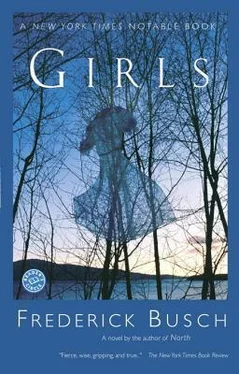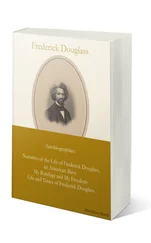Her eyes were on me. She simply nodded. I waited for her to talk about her horrible dreams of Janice, but she moved her head that one time and then she was still as she watched me.
“Your hope has to be in the authorities.”
She didn’t speak.
“And God,” I lied.
She said, “Hannah. Is she yours?”
“Was,” I said. “She was.”
“Oh, Jack,” she said.
“No,” I said, “it was years ago.”

On the car radio, one of those round, cheerful voices you hate if you aren’t feeling well said the long-range forecast was warmth. Temperatures would stay in the twenties, he said merrily, and I thought that if they did, the snow would melt off in two or three weeks. It was three and four and even five feet high in places on the banks of our road, and then it would be gone. We wouldn’t remember the cold or how we had to fight every day to get out and around. Though I wasn’t convinced. It seemed to me we were condemned to winter. I tried to see dirt, but I could only imagine snow.
I let the dog out and I took a couple of extra codeine jobs. Maybe I would get in touch with William Franklin, I thought, and ask him for something with a heavier punch. The brain waves must have been boiling that day, because as soon as I thought the word punch , the telephone rang, and Sergeant Bird, telling me what a considerable courtesy it was that he took the time to call, said they had followed up on my recollection of speed gloves and they had run a fighter who looked good for it, and they were holding him for me to check out. I had to hurry, he said, because if he was the one, and if he mattered to heavy people in Syracuse or Utica, a lawyer would be there taking him out on a leash in a couple of hours. I told him I was used to either military procedure, where basically I’d arrested who I’d pleased as long as he wasn’t an officer, or campus justice, where I was powerless with everyone no matter what they did.
Which, when I hung up, had me thinking of Rosalie Piri for some reason. I suppose it was the powerless part. Although that made me think of Fanny, too.
I called the dog in and gave him a rawhide stick to chew on. I noticed a great deal more white in his muzzle, and the slight thickening there that tells you how much older they are. What he did with his face, I would have described as smiling, if it didn’t make me feel too sentimental. He smelled of cold and snow. I nuzzled his face and he bumped me with his head while he worked on the rawhide.
I didn’t enjoy fitting my body into the seat of the Ford, nor did I like the backing-up part, where I strained to see. Letting it roll forward and steering small with my arms clamped to my sides made me feel better. So I did, shutting off the radio voice. I headed south, toward the state police barracks, squinting against a bright sun that seemed to be part of the argument — Mrs. Tanner would call it a plan — about winter ending. I screwed my face up against the sunlight, but I would not have given even money on spring.
Bird wasn’t there. A square, thick uniformed trooper with very curly dark hair and a frowning mouth who called me “Sir” but didn’t enjoy it took me to an office.
He said, “This guy was easy. He was the only overweight noncontender with his hair in a ponytail who limped.”
“How many gyms did you look in?”
“Syracuse cops walked into one, walked out, walked into the other, and there he was.”
“Was he ever any good?”
He reached for the cut-glass knob and stopped. He looked amused when he said, “You mean, were you good enough to hurt a pro?” He made sure I saw him take in the splints, the bruises, the cuts, the way I stood like a man held together with tape.
“Guy stuff,” I said.
“Yeah. Well, he wasn’t in anyone’s stable. He trained on his own and he fought on his own. He did the circuit — Albany, Syracuse, Buffalo, Cleveland, Detroit. He lived that way for a couple of years. He still has his eyes. You’re a lot older than he is.”
“What was his name?”
“What it still is: Joe Corona.”
“Southwestern?”
“I think he’s from around here. Probably, he liked Mexican beer.”
“Where’s the one-way glass?” I asked him, pointing at the paneled wooden door.
“In the barracks in Wampsville and on TV,” he said. “Wait here.” He went into the office and shut the door behind him. Eventually, I heard furniture scrape.
As he opened the door again, he said to someone behind him, “Do not change your position. Don’t move.”
He left the door cracked open, and he whispered to me, “Check him out.”
I looked over his shoulder, where he crouched, and I saw the man I thought of as the Indian. His face was turned three-quarters toward me, and he held himself rigidly. This was a man who listened to instructions. His skin looked sweaty; his hair was out of the rubber band and hanging down his neck. He looked strong but out of shape. Well, so was I. All he looked was uncomfortable. I was the one with busted fingers and torn-up ribs.
I said, “Yes.”
“For certain,” he said, closing the door.
“Yes.”
“Now, you’re—”
“Yes,” I said. “Was he limping badly?”
“He said he sprained his knee.”
“I thought maybe I busted some ligaments for him.”
“You did him all right,” the trooper said.
“Good.”
“And he’s the one. Finally, officially, for once and for all.”
“Cross my heart,” I said.
“You’ll have to pick him out of a lineup with lawyers there.”
“And be surprised when I see him?”
“If you would, please, yes.”
“Isn’t justice wonderful?” I said.
“I’m sorry,” he said, “did anyone mention justice? We’re just trying to lock the fucker up. ”
So, I thought, driving home and thinking of codeine, we had found the malefactor. He had nothing to do with Janice Tanner, something to do with the people who sold the drugs to William Franklin, who sold the drugs to the students. That traffic would continue. If the Indian knew anything, he’d be out on bail to keep him quiet. If he was a hired banger, and they were insulated from him by a cutout they trusted who’d done the hiring, he would stand for assault, and he would serve some months, maybe in the county jail. And, meanwhile, Janice Tanner was gone. The students were stoned. Rosalie Piri stretched out in the cold blue light of a room in my imagination. And Fanny was as far from me as she could get. Haven’t you done well, I told myself.

If Fanny had been in the car with me, she’d have pointed to the faintest pink color in the tips of the dark trees. She would have found a willow tree on the side of the road and showed me that its branches were the slightest bit thicker at the ends. Because I was fastened immobile by the pain, I saw little of the sky. Mostly, I saw black empty boughs and white snow, and nothing convinced me of winter ending, not even the slight softening of the snow packed ten or twelve inches onto the surface of our road.
I drove past campus, and I drove to Rosalie Piri’s house, and I pulled up her drive to park the car in back. I couldn’t have stated a reason to anyone, much less to her, and I hoped very hard that she would be in the classroom or her office or at the market or buying new tires for her terrible car. I hoped so hard that she would be gone, I forced myself out of the front seat and over to her back door, and I made myself knock.
“You aren’t here,” I said.
Opening the door, she said, “Oh yes I am. Is your wife with you?”
Читать дальше











